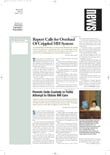Education, broadly defined, is the essential purpose of a professional association. From advocacy to research, at APA all parts of the organization participate in educational endeavors.
Deborah Hales, M.D., who has specialized in the education of psychiatrists at all levels, serves as director of APA’s Division of Education, Minority, and National Programs and the director of education for the American Psychiatric Institute for Research and Education (APIRE). Working with APA’s Council on Medical Education and Career Development and its components, she has responsibility for policy development and implementation of educational programs for members and potential members.
A major success this year has been the development of the publication FOCUS: The Journal of Lifelong Learning in Psychiatry. The journal is published by American Psychiatric Publishing Inc., APA’s publishing division. Despite its newness, members have reacted enthusiastically—evidence that a significant need is being met. As part of an overall strategy, FOCUS will form the backbone of a program designed to provide educational opportunities for certification/recertification of psychiatrists.
Indeed, the American Board of Psychiatry and Neurology (ABPN) has just endorsed APA as an approved organization for preparing psychiatrists for maintenance of certification and developing a lifelong-learning track in psychiatry. As is well known, psychiatrists certified in l994 and beyond are required to be examined on a 10-year cycle for recertification (Psychiatric News, April 4).
Recruitment and development of residents and early career psychiatrists (ECPs) as APA members and leaders are obviously important. The education division’s offices of Undergraduate and Graduate Medical Education and Career Development (2.5 staff positions plus the director of the division) develop, organize, and support educational and leadership programs for medical students, psychiatry residents, and ECPs. This work is done in collaboration with allied organizations in conjunction with APIRE programs and staff and several APA committees, including the committees on Residents and Fellows, Medical Student Education, Early Career Psychiatrists, and Women.
The Office of Undergraduate Education works to promote high-quality teaching of psychiatry to medical students and to attract talented medical students into psychiatry residencies. The office supports programs for students on their campuses and actively participates in national medical-student meetings. This office also publishes the Psychiatric Residents’ Newsletter, Medical Student Newsletter, and an education newsletter that aggregates news from educational organizations for residency directors, as well as other educational materials.
The Office of Graduate Medical Education and Career Development is concerned with designing educational programs that will educate residents and help psychiatrists advance in their careers.
To that end, many sessions at APA’s annual meeting are planned for psychiatry residents. Some of the most popular have been those designed to assist residents with passing the boards and setting up a practice. To identify other programs that residents need, a survey designed to assess the elements residents believe contribute significantly to the development of professional identity, the difficulties and challenges that residents face during their residencies, and the forms of support and encouragement that they use during their residencies has been developed and will be distributed to all residency programs in the United States. Overall findings will be shared with program directors.
An example of a program for residents is the APA/Aventis Pharmaceuticals Annual Meeting Travel Fellowship Program for Women Resident Leaders in Psychiatry. The program, now five years old, is designed to bring women residents who have demonstrated leadership potential to APA’s annual meeting, where they participate in a special track of sessions and meet with senior women mentors. The program has brought approximately 175 residents to the annual meetings, providing a great base for future leadership in APA and in the field of psychiatry.
The office recently published A Resident’s Guide to Surviving Psychiatric Training. Topics include how to maximize educational experiences, how to become a leader, balancing personal and professional life, legal issues, financial issues, and special issues in patient care and technology. It is free to residents and training directors.
ECPs have programs that are specifically designed for them in conjunction with APA’s annual meeting and Institute for Psychiatric Services. One of these is the Fellowship in Public Psychiatry and Public Policy Leadership, which is designed to bring ECPs with a special interest in these areas to the institute for two consecutive years. This travel fellowship, supported by an educational grant from Janssen Pharmaceutica, is given each year to six ECPs who have shown promise in leadership or public-policy formulation. In addition to special sessions in leadership, the program provides access to senior mentors and opportunities to meet with leaders in the field in the cities in which the institute is held.
APA also makes available a variety of materials for ECPs on its Web site. One of these is the ECP Practice Management Handbook (developed by the Office of Health Care Systems and Financing), which includes chapters on economic issues, starting a private practice, legal and malpractice issues, negotiating contracts, managed care, jobs, and research interests.
Educational programs inherently provide opportunities for career development for members at all stages of their careers. And, as we noted at the beginning of this article, all parts of APA participate in these endeavors.
Feel free to send your comments, questions, and/or suggestions to me at
[email protected]. ▪

